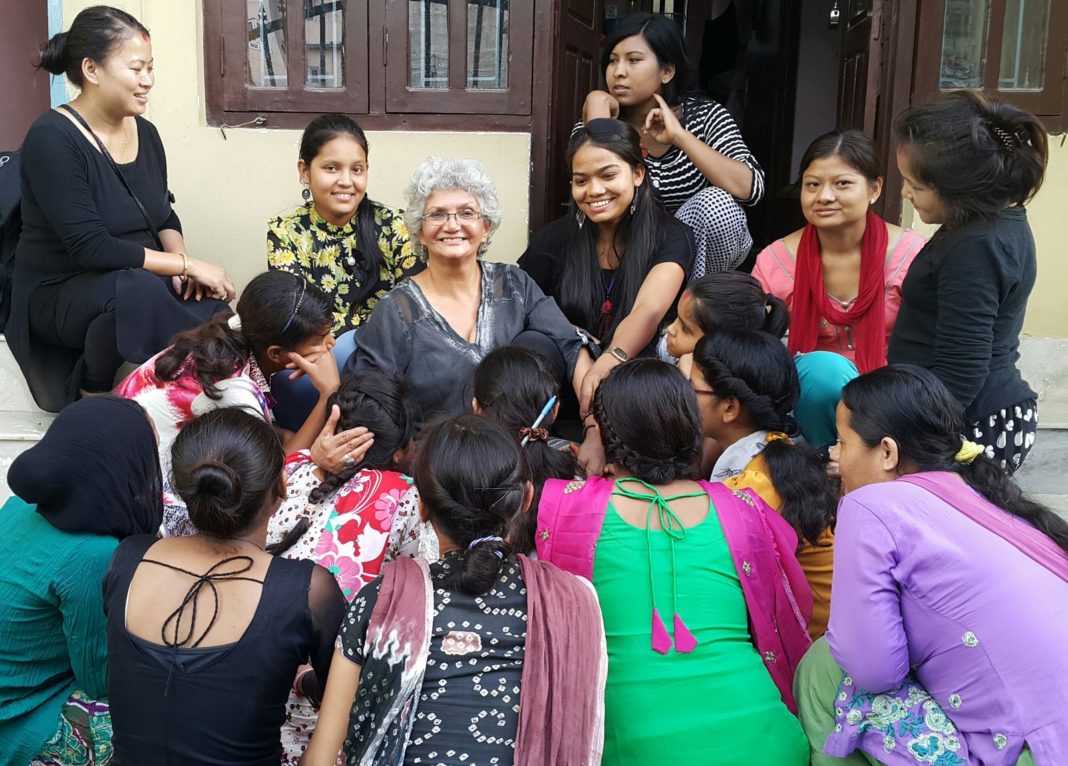Any mother can relate to the desire to get her children back if they have been taken from her. For some, that might result from a court hearing or a custody battle, but for one young woman whom Yelm resident Kali Basi encountered in Nepal, the challenge was more daunting. “She’s the mother of two children who was sold into the human trafficking industry by her husband,” says Basi. “Now that she is free, she wants to stand on her feet, be independent and hopefully get her children back.”
 Helping such women regain their lives has become a mission for Basi, a fashion designer, who has spent the last year setting up programs abroad for victims of human trafficking. Originally from New Zealand, she owns Kali Basi Design, offering unique handmade clothing created from natural fibers and recycled fabrics.
Helping such women regain their lives has become a mission for Basi, a fashion designer, who has spent the last year setting up programs abroad for victims of human trafficking. Originally from New Zealand, she owns Kali Basi Design, offering unique handmade clothing created from natural fibers and recycled fabrics.
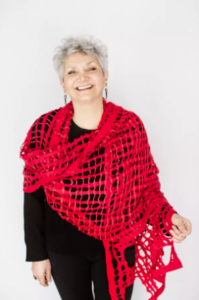
Human trafficking worldwide has exploded in the past decade and is currently the second biggest crime industry in the world after the drug trade. Basi first discovered the issue 35 years ago while living in New Zealand, but owned a business and was raising a young child at the time. She was also preparing to move to the United States. “I wasn’t ready to deal with it at that time,” she says.
Then, last year, Basi picked up a book by international humanitarian photographer, Lisa Kristine. “It was an amazing book on slavery and the issue hit me in the face again,” she says. “I said to myself, ‘When are you going to do something about it?’ So I’ve taken this big leap and gone into it.”
Basi’s first contact was with the Southeast Asia director of Free the Slaves, a Washington D.C.-based organization. “I gave her my credentials and we talked about half-way homes that were available for me to go in and work with these girls,” says Basi. As a foreigner, she wanted to work with girls and women who had already been freed rather than risk attempting to free them herself.
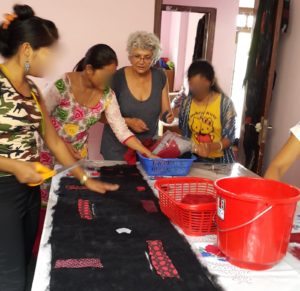
Basi’s next stop was in Nepal at Shakti Samuha, the world’s first organization run entirely by survivors of the sex trade. After an initial meeting, she proposed a program where she would mentor survivors and instruct them in the art of Nuno felting and textile design. “I’m training them to become artists. If they can have an income, they can stay alive,” says Basi. “The difference between the West and Asia focuses on the stigma attached by society. When we free these young girls – some are five and six years old – it’s like a death sentence. No one wants them and it’s really hard for them to fit back into society, let alone find work.”
Returning home, Basi established Conscious by Kali, a soon-to-be non-profit clothing line with net proceeds benefitting victims of human trafficking. Later she returned to Nepal and, using her own funds, purchased raw materials in India and had them trucked to Kathmandu where she spent four months training the girls and women. “Now they’re producing a wonderful line of work which we’re selling online and through shops,” she says.
In the process, Basi has formed tight connections with the survivors, many of whom call her “Mama G.” “A lot of them don’t have families,” she says. “It’s a very close bond. I’ve become mother to few dozen girls.” Some have been so badly abused that they can only work for a few hours a day. Through her program Basi offers training as well as well as on-going employment.
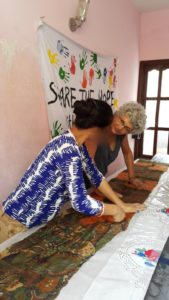
Basi has been amazed at the support the survivors offer each other. “They’re at different levels of rehabilitation,” she says. “Some are on medication and some are very withdrawn, but as each new person comes into the center, they gather round and really help each other. If there’s a conflict, they forgive each other immediately. In the outside world we tend to hold grudges, but they know what each one of them is going through. The love is incredible.”
As Conscious by Kali moves through the process to become a non-profit, Basi plans to expand her programs, provided she can gather the necessary funds. “Money is really important,” she says. “I funded the first program myself, but now it will take outside funds to keep it going.” She has launched an Indiegogo campaign to help raise the much-needed funds where each donor receives a unique, hand-crafted scarf created by the women in her program.
Meanwhile, the survivors are also expanding their repertoires. “They’ve started painting beautiful silk scarves that say ‘I am Free,’” she says. “They need to steam them for three hours, so we’re looking at getting a solar cooker so they can process the scarves. I’ve already been approached by three other groups to see what kind of programs I can set up for them.”
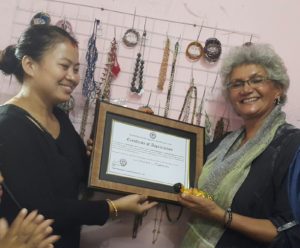
Closer to home, Basi wants local people to become aware of how big the problem is. “Seattle is becoming a huge hub,” she says. “This is happening everywhere.” At trade shows, survivors share their stories with her, including one who survived her experience while a friend did not.
“This is a multi-billion dollar industry,” says Basi, warning that the industry is active both abroad and right here in the U.S. Despite the tragic stories she hears, Basi is encouraged by the work she’s begun and is dedicated to continue, advocating, supporting and fighting for those women who fight for themselves.
For more information about Conscious by Kali, visit www.consciousbykali.com or call 360-894-8290. Visit the Indiegogo campaign page to support Basi’s efforts.







































